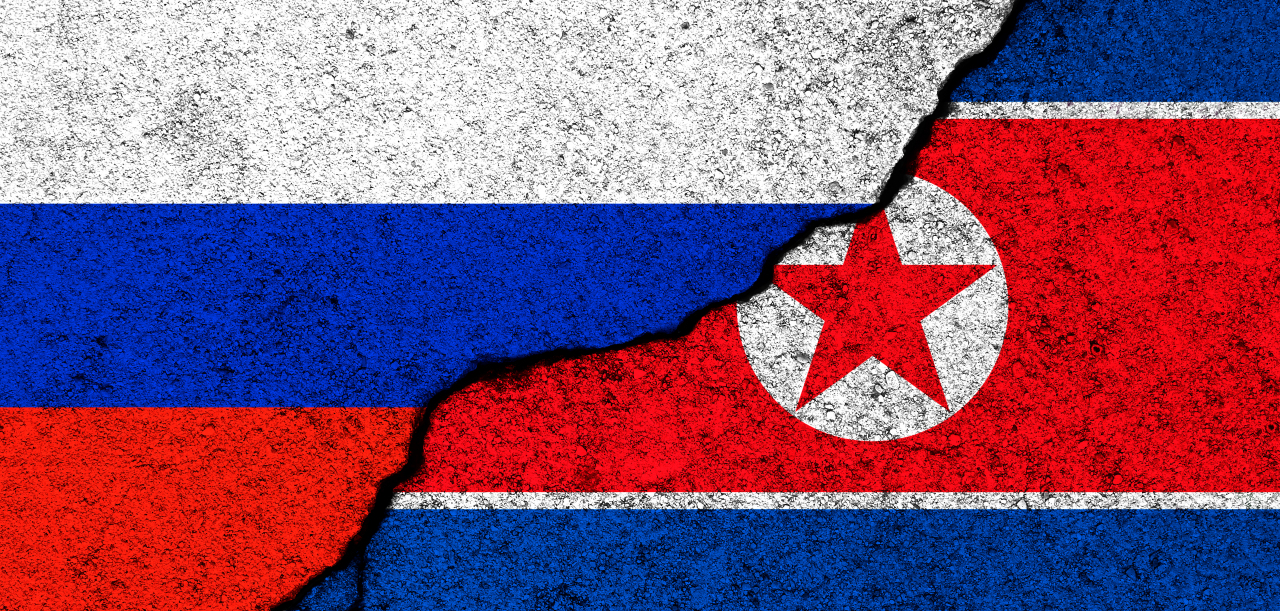 |
The Russian (left) and North Korean flags. (123rf) |
South Korea is looking closely into momentum for tighter ties between North Korea and Russia ahead of their potential “leader-level talks” over the North getting technology to advance its nuclear arsenal in return for supplying Moscow with weapons to support its war in Ukraine.
A senior official at the Unification Ministry in Seoul said Tuesday that cooperation involving North Korea and its neighbors along its northern border should take place in a way that does not violate “international norms and peace.” United Nations sanctions prompted by the North’s nuclear buildup ban the country from signing any arms transfers.
In a separate statement Tuesday, the Foreign Ministry in Seoul called on UN member countries to abide by Security Council resolutions banning such arms exchanges with North Korea. Military cooperation that brings harm to international peace and stability should not take place, it said.
The Unification Ministry official noted there is nothing currently to confirm whether North Korean leader Kim Jong-un and Russian President Vladimir Putin will meet during Kim’s trip next week to the Russian port city of Vladivostok. The New York Times reported on their potential talks this month, citing US and allied officials.
The summit, the report said, would discuss Kim giving Putin artillery shells and anti-tank missiles in exchange for advanced technology for satellite and nuclear-capable submarines. Kim, expected to travel by armored train, last week underscored a stronger navy with nuclear capability, marking the country’s Navy Day. He is pushing for a third launch to put a spy satellite into orbit after two failures this year.
The meeting would come at a crucial time when Pyongyang and Moscow are seen working on holding joint military drills. On Monday, South Korea’s spy agency said Russian Defense Minister Sergei Shoigu proposed to Kim holding joint naval drills that included China during his trip to Pyongyang, the North’s capital, in late July.
It was unclear whether Kim had accepted the offer at the meeting, which was meant to mark North Korea’s “victory” over South Korean and US forces in the 1950-53 Korean War, a conflict that needs a peace treaty to replace the cease-fire. Shoigu is the first-ever Russian defense chief who made such a tour since the fall of the Soviet Union in 1991. Shoigu says Moscow-Pyongyang drills are a possibility.
Such three-way drills would add to concerns of a US-led coalition that has been working on disarming the North. South Korea, the US and Japan agreed to bolster cooperation over Pyongyang’s missiles at their first landmark summit in August.
Leader Kim has said the meeting the US hosted at its presidential retreat was led by “gang bosses,” diminishing the agreement made there. The US-led group expects joint drills to take place to contain the Kim regime, separate from the Seoul-Washington annual drills in place. Pyongyang calls them a rehearsal for invasion.
But analysts in Seoul downplayed the possibility for three-way drills involving North Korea and its two biggest supporters -- Russia and China.
“China won’t step in because it’s rather looking to deescalate tension with the US, at least until the APEC summit in November,” said Park Won-gon, a professor of North Korean Studies at Ewha Womans University, referring to the Asia-Pacific Economic Cooperation gathering in San Francisco. “And without China, Russia-North Korea drills alone wouldn’t mean as much,” Park added, referring to the North’s small coastal navy.
Park added that weapons exchanges between Moscow and Pyongyang would make it harder for Kim to dismiss “growing anti-Russia sentiment shared among NATO countries,” referring to the Western military alliance, a group that decries Russia’s war in Ukraine. “So whether Kim would actually go for the transfers remains to be seen, I’d say.”
Meanwhile, US Ambassador to South Korea Philip Goldberg said Russia and the North appear to be seeking closer ties as a result of their increasing isolation from the outside world.
“They’re both isolated states, without the ability to really access anything in the world due to sanctions and their own activities,” Goldberg said at a local forum Tuesday. The to US envoy added that China pursues “its own interests regardless of what might have been described as an unlimited friendship with Russia,” suggesting Beijing’s motivation for better ties might be different from the one shared by Moscow and Pyongyang for theirs.







![[Today’s K-pop] Blackpink’s Jennie, Lisa invited to Coachella as solo acts](http://res.heraldm.com/phpwas/restmb_idxmake.php?idx=644&simg=/content/image/2024/11/21/20241121050099_0.jpg)